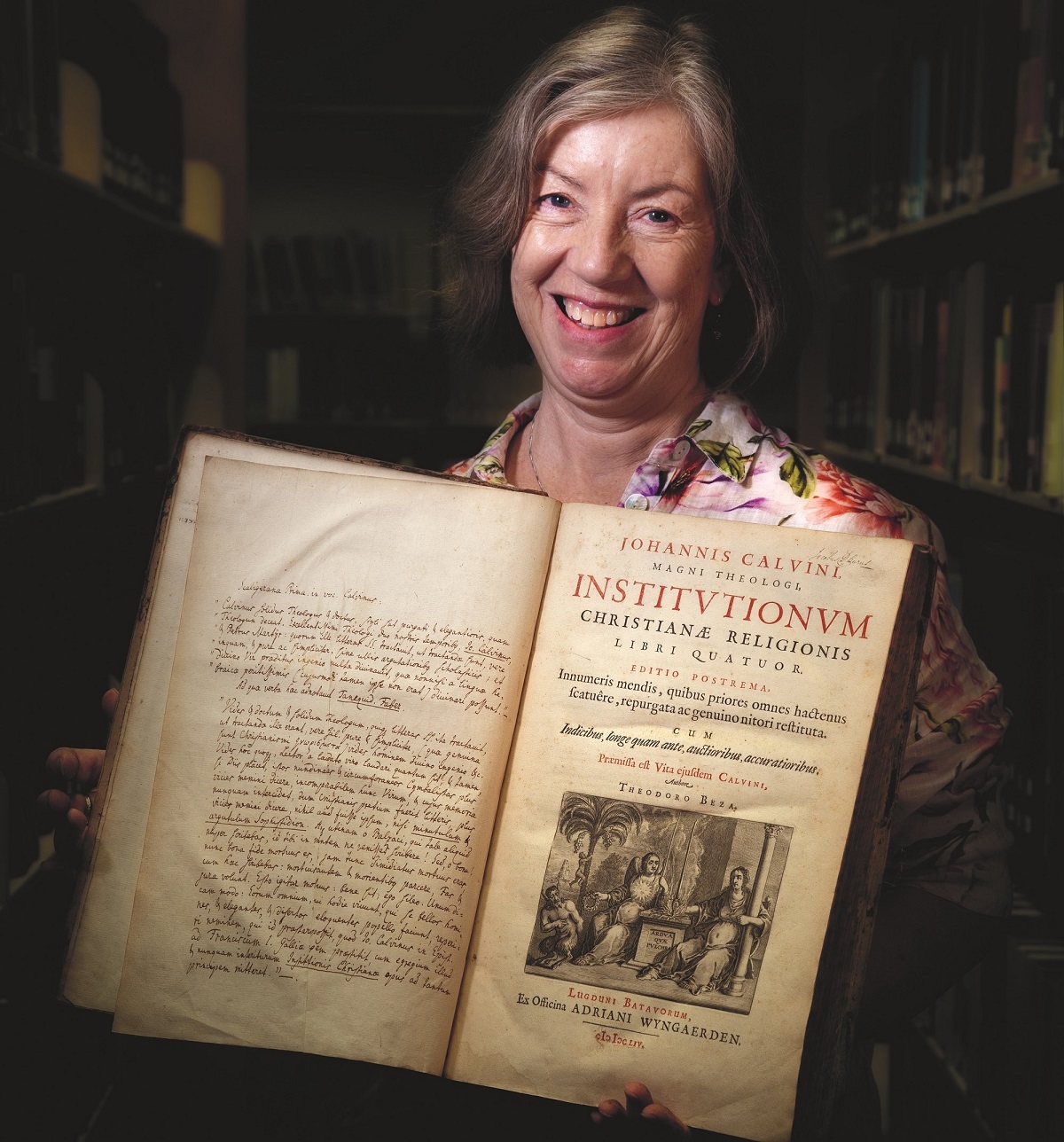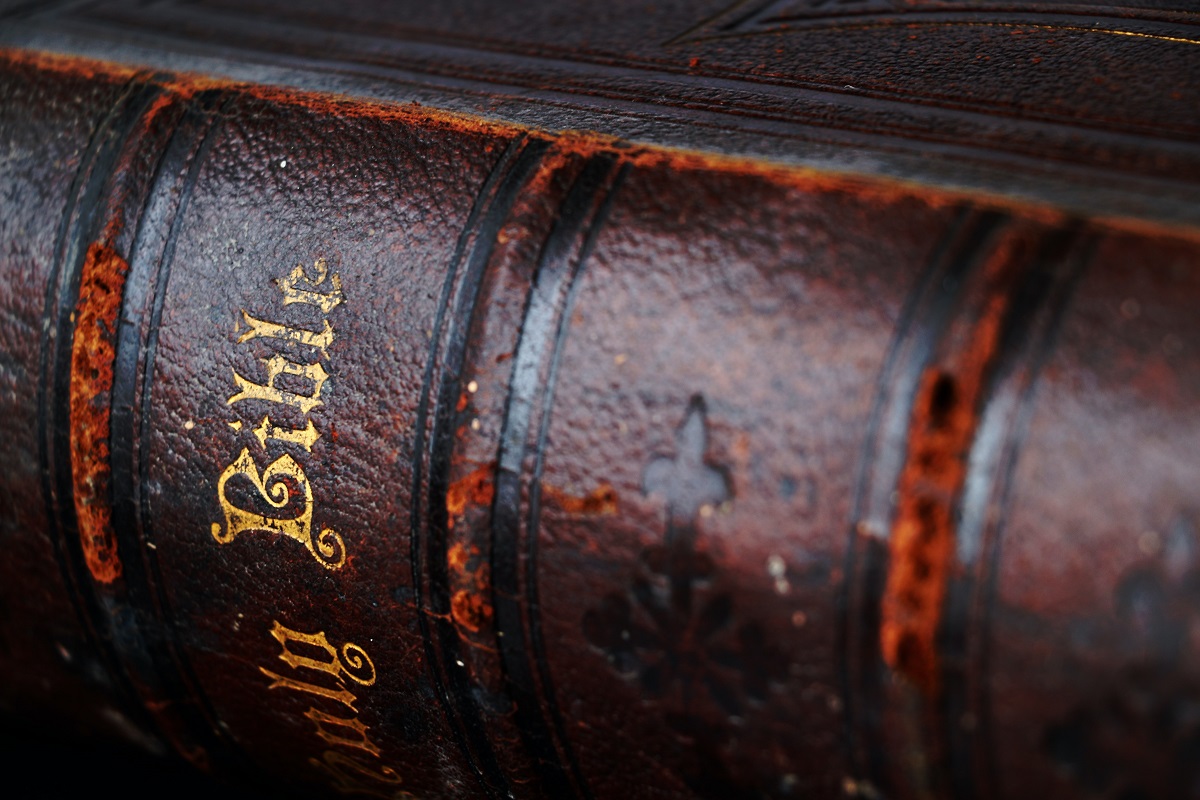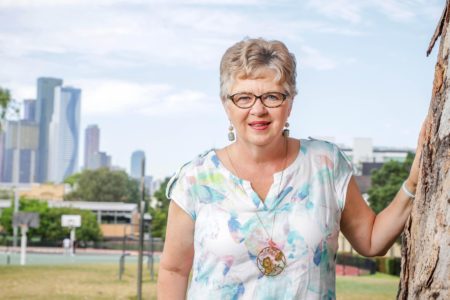By Andrew Humphries
When Ballarat woman Pippa Lidgett uncovered a rare and historic book belonging to her father Bill last year, she knew there was only one place it could be properly looked after.
The book, published in 1634, is now housed at the Dalton McCaughey Library at the Centre for Theology and Ministry in Parkville, under the watchful eye of CEO and chief librarian Charlotte Clements.
Founded by the Australian Jesuits and Uniting Church Victorian and Tasmanian Synod, the library’s name honours Fr William (Bill) Dalton and Rev Dr Davis McCaughey, who established it in 1970.
It houses more than 300,000 volumes, and a number of noteworthy collections, as well as the largest compilation of Jesuitica in Australia.
The library’s collection features a broad range of theological and philosophical scholarship and is strong in Biblical studies, practical theology and church history.
Overseeing all of this with a minimum of fuss but a maximum of care, is Charlotte, who has been at the helm for four years.
While the library houses a number of historic books, the oldest dating back to 1514, it offers so much more than just that, as Charlotte likes to point out.
What many people may not know, she says, is that the Dalton McCaughey Library has gained an international reputation thanks to its extensive collection.
In fact, in theological circles, it is considered one of the world’s best libraries.
“The important point about the Dalton McCaughey Library is that it is an international brand and is acknowledged around the world for its extensive collection,” Charlotte says.
“Some people consider it the best theological library outside the Union Theological Seminary library in New York.”
Praise for the library has come from around the world, recognising its outstanding resource material and the deep knowledge of its wonderful staff.
“Researchers and scholars come and spend a lot of time here because the collection we have allows them to do that,” Charlotte says.
“Before the COVID-19 pandemic, people would come from around the world to use the library in terms of their research.”

CEO and chief librarian Charlotte Clements with one of the library’s oldest books.
Among them was well-known New Zealand theological scholar Paul Trebilco, head of the Department of Theology and Religious Studies at the University of Otago in New Zealand.
“I was really chuffed when Paul came here and so I asked him to write a recommendation about us and he was full of praise for what the library offered him,” Charlotte says.
It was, says Paul, “a wonderful place to read and to write”.
“The holdings in the areas in which I’ve been working, Biblical Studies and Patristics, are absolutely excellent and it is so good to be working on something, find a new reference, and go to the shelf and find the book there.
“And the holdings are so consistently outstanding too, of older material right up to the present day.”
With a Masters Degree in Librarianship through the Victoria University of Wellington in New Zealand, and many years’ experience in the field, including management of departments in university libraries in Australia and New Zealand, Charlotte has the perfect credentials to ensure that reviews like Paul’s will continue.
“Chief librarian is a very archaic term but essentially it means I’m responsible for everything, so basically I manage the library,” is her somewhat modest description of the role.
“I have been here just on four years and I was offered the role because of my experience running smaller libraries and services that are specialised in some ways.
“One of the things that I have done a lot in my career is go into a library and restart, either after a restructure, or to restructure it and implement a whole lot of modernisation, and that was my first task here.
“One of my strengths is that I have worked in a number of libraries and have a broad understanding of how to refresh a library, so I focused on that first when I arrived here, but it was always in the back of my mind to look at how to promote it more and make sure it is visible.”
Among the treasure trove of books in the library is the one gifted to it in April this year by Pippa Lidgett.
‘Some general directions for a comfortable walking with God: delivered in the lecture at Kettering in Northhamptonshire’ was written by Robert Bolton and published in 1634.
In the book, Bolton discusses subjects like idleness, government of the tongue, recreations, visitations, sleep and marriage.
It is now housed in the library’s rare book collection, which contains books published between the 1500s and 1920.
Bolton, born in 1572, was an English clergyman and academic described “as the greatest classical scholar of his time”.
Metropolitan Library founder James Darling wrote in 1840 that Bolton was “one of the best scholars of his time, a zealous and successful preacher, and particularly skilled in resolving the doubts of timid Christians. His style is florid and often truly magnificent”.

The Dalton McCaughey Library is considered in theological circles to be one of the world’s best libraries.
Charlotte says the library was delighted to take over custodianship of Bill’s book after being contacted last year.
“Pippa made contact and told us she had this old book that belonged to her father Bill, and her family felt it should be housed somewhere suitable,” she says.
“Bill had found the book in the early 1980s in a Uniting Church hall in Ballarat, although we don’t know if it was originally Methodist or Presbyterian.
“He obviously held on to it and then, when Pippa was looking through his things, she found it and thought ‘oh, we should pass this on so it can be looked after’.
“It was printed in 1634 and there was a tradition of book owners inscribing their own names on it, so there is, for example, an inscription from 1720 on it.
“When Pippa contacted us about what to do with it, I suggested that a library was obviously a good place for it and that would mean we could make a record of it and that is then made public, meaning it has some information about it out in the public domain.
“We’re not really resourced to look after books incredibly well, but now it is somewhere it can be found and appreciated.
“So, like a lot of theological libraries, we have ended up with a rare book because the owner has been given it, has kept it for a while, then thought it would be a terrific idea to pass it on to us because it was something they couldn’t necessarily make last in perpetuity, whereas a more specialised institution like ours can.”
Bolton’s book now joins a number of other titles with a rich history in the library.
Among the others are ‘Twelve sermons preached upon several occasions’ published in 1727, ‘The Holy Bible conteyning the Old Testament and the New’ (1632), and ‘The institution of Christian religion’ (1634).
“We have Robert Bolton’s book in our special collection section with some of the other very old books, including one dating back to 1514,” Charlotte says.
While it is only one of their many tasks, Charlotte says the team takes its custodianship of such historic items very seriously.
And there is, she says, a weight of responsibility that comes with that.
“This is something the whole team feels very keenly about,” Charlotte says.
“We have these older materials that we know are rare and have been sorted into a significant collection, but it does weigh on us because we are talking about continuing centuries of custodianship.
“Many of these old books are not widely known about and they are stored away, and this is where the weight of responsibility comes in, because we do have very old volumes.
“So we are not necessarily book historians but we are very aware of what we have here and the best practice in looking after it.
“It’s an important collection but it’s not the main focus of what the library is about and we have to be practical about that.”
As the keeper of such an important flame, Charlotte looks forward to continuing the library’s outstanding international reputation in the field of theological resources and research for many years to come.
“The library has existed for over 50 years and so it is extremely well-known among three or four generations of scholars who have made use of its resources and our expertise,” she says.
And long may that continue.
Anyone wanting to request a viewing of one of the historic books is invited to make contact with the library on 9340 8888.


